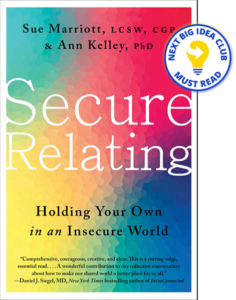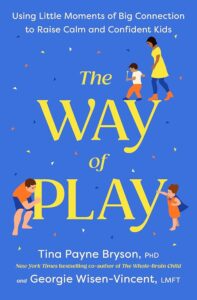
 Therapist Uncensored Podcast
Therapist Uncensored Podcast Rediscovering Play for More Secure Connections with Children – and Adults (256)
Mirroring on a Date
- Tina Payne Bryson taught a friend the "make yourself a mirror" strategy for a first date.
- This strategy, designed for parent-child play, proved applicable in adult interactions.
Play as Self-Reflection
- Play preferences reflect personality, as seen with Tina Payne Bryson's organized play and current love for order.
- Georgie Wisen-Vincent's bossy big-sister playstyle mirrors her personality, demonstrating how play reveals self.
Adapting Play Styles
- Parents should adapt their playstyle to their child's preferences, not their own.
- Tina Payne Bryson learned to follow her sons' lead, emphasizing attunement and mutual delight in play.






























Just released! “The Way of Play” – Book by Dr. Georgie Wisen-Vincent & Dr. Tina Payne Bryson, we recommend you get your copy today!
Could the key to raising resilient, connected kids be as simple as play?
Co-host Sue Marriott, with special guests, Tina Payne Bryson and Georgie Wisen-Vincent, discuss the relational neuroscience behind the powerful role of play in child development and its therapeutic benefits. Play fosters emotional resilience, strengthens parent-child attachment, and supports positive neuroplasticity. They bring in positive neuroplasticity, emotional discomfort and tons of very practical techniques.
Learn how embracing play can nurture emotional growth and empower both children and parents in meaningful ways.
“The oldest evolutionary pathways in the brain are nonverbal. Your actions always speak louder than words when it comes to your child’s mind.” – George Wisen-Vincent
Time Stamps for Playful Parenting: Building Resilience, Connection, and Joy Through Play (256)
03:08 The role of play in child development
08:57 Understanding resistance to play
14:50 The science behind play and attachment
21:12 Overcoming barriers to play
24:07 Practical techniques for parents
39:40 The importance of emotional discomfort
41:35 Over-functioning vs. scaffolding
58:31 Positive neuroplasticity through play
About our Guests
 Georgie Wisen-Vincent, LMFT, RPT-S, ECMHS is a nationally recognized play therapy expert and co-author of the new book — THE WAY OF PLAY (Penguin Random House, January 2025). She is the Founder/Director of The Play Strong Institute, a center devoted to the study, research, and practice of play therapy through a neurodevelopment lens, along with Dr. Bryson, the Founder/Executive Director of The Center for Connection, a multidisciplinary clinical practice in Southern California. Georgie is also a child, adolescent, and family psychotherapist and maintains a private practice at The Center for Connection. A graduate professor at Santa Clara University and active researcher in childhood play, attachment science, and mental health, Georgie has been commissioned as a consultant, program designer, and lead trainer for several major organizations and frequently presents to educators, parents, and clinical professionals on play therapy, trauma resilience, and the power of play-driven learning. She completed advanced study in play therapy at the University of Roehampton, London. Georgie gained specialist endorsement in early childhood mental health after completing the UC Davis Napa Infant Mental Health Fellowship. She is currently in the final phase of her doctoral program, a PhD in Infant and Early Child Development, focused on neurodiversity and parent-child attachment relationships. Click here to view her more detailed bio.
Georgie Wisen-Vincent, LMFT, RPT-S, ECMHS is a nationally recognized play therapy expert and co-author of the new book — THE WAY OF PLAY (Penguin Random House, January 2025). She is the Founder/Director of The Play Strong Institute, a center devoted to the study, research, and practice of play therapy through a neurodevelopment lens, along with Dr. Bryson, the Founder/Executive Director of The Center for Connection, a multidisciplinary clinical practice in Southern California. Georgie is also a child, adolescent, and family psychotherapist and maintains a private practice at The Center for Connection. A graduate professor at Santa Clara University and active researcher in childhood play, attachment science, and mental health, Georgie has been commissioned as a consultant, program designer, and lead trainer for several major organizations and frequently presents to educators, parents, and clinical professionals on play therapy, trauma resilience, and the power of play-driven learning. She completed advanced study in play therapy at the University of Roehampton, London. Georgie gained specialist endorsement in early childhood mental health after completing the UC Davis Napa Infant Mental Health Fellowship. She is currently in the final phase of her doctoral program, a PhD in Infant and Early Child Development, focused on neurodiversity and parent-child attachment relationships. Click here to view her more detailed bio.
 You may already know Dr. Tina Payne Bryson from her two New York Times Best Sellers The Whole-Brain Child and No-Drama Discipline. They’re both co-authored with Dan Siegel and have been translated into over fifty languages. She and Siegel also wrote The Yes Brain and The Power of Showing Up, and Dr. Bryson is the author of The Bottom Line for Baby. Her new book, co-authored with Georgie Wisen-Vincent, is The Way of Play. Her books have sold over 3 million copies combined. Tina is also the Founder and Executive Director of The Center for Connection, a multidisciplinary mental health practice in Southern California. She keynotes conferences and conducts workshops for parents, educators, and clinicians all over the world. She also consults with schools, businesses, and other organizations, including the Nike Sport Research Lab (NSRL), where she is Project Director for Mental and Emotional Performance. Dr. Bryson earned her Ph.D. from the University of Southern California, where her research explored attachment science, childrearing theory, and the emerging field of interpersonal neurobiology. The most important part of her bio, she says, is that she’s a mom to her three boys. You can learn more about her at TinaBryson.com.
You may already know Dr. Tina Payne Bryson from her two New York Times Best Sellers The Whole-Brain Child and No-Drama Discipline. They’re both co-authored with Dan Siegel and have been translated into over fifty languages. She and Siegel also wrote The Yes Brain and The Power of Showing Up, and Dr. Bryson is the author of The Bottom Line for Baby. Her new book, co-authored with Georgie Wisen-Vincent, is The Way of Play. Her books have sold over 3 million copies combined. Tina is also the Founder and Executive Director of The Center for Connection, a multidisciplinary mental health practice in Southern California. She keynotes conferences and conducts workshops for parents, educators, and clinicians all over the world. She also consults with schools, businesses, and other organizations, including the Nike Sport Research Lab (NSRL), where she is Project Director for Mental and Emotional Performance. Dr. Bryson earned her Ph.D. from the University of Southern California, where her research explored attachment science, childrearing theory, and the emerging field of interpersonal neurobiology. The most important part of her bio, she says, is that she’s a mom to her three boys. You can learn more about her at TinaBryson.com.
Resources for Playful Parenting: Building Resilience, Connection, and Joy Through Play (256)
PlayStrongInstitute.com – Official website for information and resources
Center for Connection – Official website for information and resources
Pre-Order the bonus page for their book – Click here!
Tina’s Amazon shop page – Click here for books, resources and other tools
Click to access Tina Payne Bryson’s Social Channels – Facebook, Instagram, Youtube & Twitter
Georgie’s Instagram handle – @georgiewisenvincent
TinaBryson.com – Website for information and resources
Click here to subscribe to Tina Payne Bryson’s newsletter
How to contact Tina – Email info@tinabryson.com
How to contact Georgie – Email Georgie@thecenterforconnection.org

Get early access and discounts to things we produce, plus a totally ad-free private feed. In addition, recieve exclusive episodes recorded just for you and have input in topics you would like to learn more about.
Sign up for our premium Neuronerd plan!! Click here!!
And of course, our book is also a great resource – it’s for professionals and life-long learners of all kinds.

Get your copy of Secure Relating here!!
Upcoming Events here
Ann and Sue are presenting a clinical deep dive at the Psychotherapy Networker Symposium – March 20-23, 2025. Join us! 
Rethinking Attachment – Using the Attachment Spectrum in Clinical Practice
Please support our Sponsors – they keep the show free and accessible to everyone!
![]()
Coffee alternative powered by mushrooms! Right now, you can get 20% off plus a FREE starter kit when you shop exclusively Piquelife.com/tu
![]() Cure is offering 20% off your first order! Stay hydrated and feel your best by visiting curehydration.com/TU and using promo code TU at checkout.
Cure is offering 20% off your first order! Stay hydrated and feel your best by visiting curehydration.com/TU and using promo code TU at checkout.

Compare high quality, in-network doctors, choose the right one for your needs, and click to instantly book an appointment. Go to ZocDoc.com/TU



